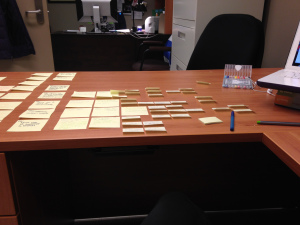3 Mar 2015
At Oxford the last step before you submit your final doctoral thesis is called “Confirmation of Status.” Essentially it means: you think you have collected all your data and made a solid plan for writing, we are going to check you haven’t completely gone off the rails. You submit two full chapters, abstracts for all the rest and a plan for when you are going to finish writing. The experience has the potential to be fundamentally crushing. This is normally the first time anyone other than you and your supervisor reads your work as a (soon to be) whole. While the fear of having turned down the wrong path is heavy, the experience can also be invigorating. They read your work and try to see the full story you have been dedicated to telling!
For me, Confirmation was just that, invigorating. I had exceptional assessors who had clearly not only read but taken time to think about what I had written. They were motivational even in their critiques and concerns. They were open to my explanations and treated the interview as a conversation about how this work could become as meaningful as possible.
I am looking at how political opinion leaders in Canada source and share political information. In particular I focus on what motivates these opinion leaders to choose different channels of communication for sharing facts and discussing politics (e.g. why Facebook over face-to-face conversation, or text message over Twitter). These opinion leaders are thought to be important political players because they help keep the non-engaged citizenry politically aware through personal influence. Since opinion leaders have a lot more channels of communication to choose from, the mechanism of influence is in question.
My assessors and I left the interview most excited about the strategic approach my interviewees take when it comes to communicating about politics. I am also pretty excited about the “trace interviewing” approach Heather Ford and I developed which helps contextualize social media trace data and gives a voice to the creator of those traces/acts of communication. We bring visualizations of a person’s social media data into an interview setting and jointly interpret those data which means we can explain things like why a person tweeted what they did and what that person thinks a Facebook like actually means. (Note: our paper is in a forthcoming issue of the Journal of International Communication but you can email me for a draft copy.)
Since passing confirmation at the start of February I’ve been busy writing back in Toronto where I am living for the year. I work out of the iSchool at the University of Toronto most days but also spend time at Ryerson’s School of Professional Communication. I’ve also had the opportunity to present parts of my methods and discussion chapters and am headed to a doctoral workshop for late stage candidates at Princeton next month. It never ceases to amaze me how much easier it is to write once I have presented to an audience.
